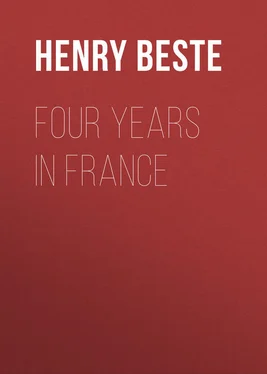Henry Beste - Four Years in France
Здесь есть возможность читать онлайн «Henry Beste - Four Years in France» — ознакомительный отрывок электронной книги совершенно бесплатно, а после прочтения отрывка купить полную версию. В некоторых случаях можно слушать аудио, скачать через торрент в формате fb2 и присутствует краткое содержание. Жанр: foreign_antique, foreign_prose, Путешествия и география, на английском языке. Описание произведения, (предисловие) а так же отзывы посетителей доступны на портале библиотеки ЛибКат.
- Название:Four Years in France
- Автор:
- Жанр:
- Год:неизвестен
- ISBN:нет данных
- Рейтинг книги:4 / 5. Голосов: 1
-
Избранное:Добавить в избранное
- Отзывы:
-
Ваша оценка:
- 80
- 1
- 2
- 3
- 4
- 5
Four Years in France: краткое содержание, описание и аннотация
Предлагаем к чтению аннотацию, описание, краткое содержание или предисловие (зависит от того, что написал сам автор книги «Four Years in France»). Если вы не нашли необходимую информацию о книге — напишите в комментариях, мы постараемся отыскать её.
Four Years in France — читать онлайн ознакомительный отрывок
Ниже представлен текст книги, разбитый по страницам. Система сохранения места последней прочитанной страницы, позволяет с удобством читать онлайн бесплатно книгу «Four Years in France», без необходимости каждый раз заново искать на чём Вы остановились. Поставьте закладку, и сможете в любой момент перейти на страницу, на которой закончили чтение.
Интервал:
Закладка:
It is curious to observe with what facility the English church can distinguish between itself and the catholic in a question of persecution or civil exclusion, and how readily its portion of catholicity, when pressed by the argument of unity, is re-asserted and resumed.
A protestant Anglican friend said to me, one day, "We are all catholics; you are a Roman catholic, and I am – ." He hesitated. "What?" said I; "an English catholic?"
No Christian community, separated from the church, can claim to be the church; the date of its separation precludes the claim. "Prior venio," says Tertullian. Neither can it be a portion of the church; community in things sacred being essential to unity. A mark is also given by Christ himself, by which his one church may be known: "Thou art Peter, and on this rock I will build my church." All antiquity has recognised the pope of Rome as successor of Peter.
Having obtained this view of the subject, from reading several works of the Fathers, I gave up the absurd notion of a true church teaching a false doctrine, and only wondered how I could have retained it so long. A church is essentially a teaching society, and, if it teach falsely, it has failed in the very end and purpose of its existence. There is another mode by which it is attempted to save the indefectibility of the church, namely, by supposing that, as there were seven thousand in Israel, known only to God, who had not bowed the knee to Baal, so there always existed somewhere some protestants. This fancy I had never adopted. The church is a city on a hill, not a candle under a bushel. Having recognised the church by these marks, which are found united in it alone, I admired that Providence which supplied to the unlearned Christian or convert sufficient motives for submitting his judgment to the doctrine of the church, instead of laying him under the necessity of judging of the church by the doctrine: which, enabling him to verify the credentials of the ambassador, makes him confidently and joyfully receive the embassy of grace and peace.
In this disposition of mind not much road remained for me to travel, and I followed henceforward the guidance of the church; studying for instruction, not for dispute; to remove prejudices, and correct misapprehension.
Communion under one kind, as at present practised in the catholic church, is ridiculed by Swift, who tells how my lord Peter locked up his cellars. Swift might have added to his buffoonery, by telling how the same lord Peter, many hundred years before John or Martin were born or thought of, served no mutton to his wine. In the early ages, it was the use to give the blessed Eucharist, under the species of wine only, to sick persons and to children. While inquiring on this subject, an ingenious mistake of the Anglican translation of the Bible was pointed out to me: the Apostle says, "he that eateth this bread or drinketh this cup of the Lord unworthily, is guilty of the body and blood of the Lord: " or being altered into and , this text can no longer be quoted to justify communion under one kind: it still remains, however, a strong argument for the real presence, since it would be impossible to be guilty of the body and blood of the Lord, if they were there only in figure. He who stabs the portrait of the prince commits an insolent outrage, but the prince is safe.
Ward's "Errata to the Protestant Translation of the Bible" is a book that will set many matters right in the minds of those who are not averse from conviction. The author was obliged to fly his country on the publication of his work; as was Bishop Challoner, on account of "Memoirs of Missionary Priests."
Of the seven sacraments, two are retained under that name by the Anglican church: I had already proclaimed myself the advocate of what is, to all intents and purposes, the sacrament of penance. Confirmation is administered by a bishop, as among catholics. The form of giving benediction by the imposition of hands is as ancient as the patriarch Jacob, who thus blessed his grandsons, the sons of Joseph. Does any spiritual grace follow the blessing of the bishop? If so, it is a sacrament. The ordering of priests, in the church of England, is evidently sacramental; for the bishop, laying his hands on the person to be ordained, bids him "receive the Holy Ghost." Matrimony is called by the apostle "a great mystery;" mystery is the Greek word for sacrament: grace is required to sanctify so important a contract. The church of England celebrates it as a religious rite.
Thus far the dispute about the number of the sacraments seems to be a "question of words and names." Extreme unction is totally rejected by the church of England, because miraculous effects no longer follow the administration of it. It is not very clear that restoration to bodily health is promised by the apostle, St. James, c. 5. v. 14.; but "the prayer of faith shall save the sick man, and the Lord shall raise him up," may mean this, or may mean spiritual help; doubtless, however, the promise, "if he be in sins they shall be forgiven him," authorises the continuance of this rite. I have also heard it observed, that it fails in that condition annexed to the definition of a sacrament in the Anglican catechism; it is not "ordained by Christ himself." But, if it was attended with miraculous effects, it is satisfactorily proved that the apostle was sufficiently authorised in its institution.
If the church of England will believe purgatory to be "a fond thing," far from recommending the book of the Macchabees as good for an example of life, it ought not to allow it to be read in churches at all; for there it is related that, after a victory, part of the spoil was sent to Jerusalem that prayer might be offered for the dead, "seeing it is a good and wholesome thing to pray for the dead." This was a downright popish practice, justified by a popish reason. Thus All Souls College was founded to pray for the souls of those slain at the battle of Agincourt. Of this ancient, this almost universal, this consolatory practice of praying for the dead, I shall say no more, than that it may be inferred from the words of Christ, that sins are forgiven after death; since he says, "all sins and blasphemies shall be forgiven to man," that is, are pardonable on repentance; "but the sin against the Holy Ghost shall not be forgiven, neither in this world, nor in that which is to come." There are then sins that are forgiven in the world to come: but when? immediately on the entrance of the soul into its future state of existence? This would be equivalent to forgiveness in this world. After a delay then? this delay is itself a purgatory.
On this head, the catholic church has defined simply that there is a purgatory, and that souls, therein detained, receive help from the suffrages of the faithful: that this belief may be abused, does not prove it to be unfounded, or vain, or "fond."
Men abuse every thing, even the goodness and long-suffering of God. They rely on a death-bed repentance: they rely on purgatory. It is to be feared that many, by the hope of heaven after purgatory, have been betrayed into a state of final reprobation. On a death-bed repentance St. Austin remarks, that there is but one instance of its assured success, – that of the penitent thief; and he adds, very beautifully, "unus erat, ne desperes; unus tantum, ne præsumas."
The Reverend Father O'Leary replied to an Irish bishop of the establishment, who said to him, "Mr. O'Leary, I do not like your doctrine of purgatory," – "My lord, you may go further, and fare worse."
Amongst its thirty-nine articles, the Anglican church has one against works of supererogation, for the purpose of casting a censure on certain popish practices. The article bears a plausible show both of argument and humility; but the humility, taken as argument, proves too much, since it proves that our good works are useless to ourselves as well as to others. I will give the reader an instance of a work of supererogation, in which he will at least be at a loss to discover any "impiety." My mother wrote to me at Oxford, – "I went into a shop the other day to order some Gloucester cheese; a poor man was there, buying a cheese for his family; I paid for it for him: for this, I hope, God will bless you ." My mother was no theologian, and suspected no more harm in giving an alms for me than in praying for me.
Читать дальшеИнтервал:
Закладка:
Похожие книги на «Four Years in France»
Представляем Вашему вниманию похожие книги на «Four Years in France» списком для выбора. Мы отобрали схожую по названию и смыслу литературу в надежде предоставить читателям больше вариантов отыскать новые, интересные, ещё непрочитанные произведения.
Обсуждение, отзывы о книге «Four Years in France» и просто собственные мнения читателей. Оставьте ваши комментарии, напишите, что Вы думаете о произведении, его смысле или главных героях. Укажите что конкретно понравилось, а что нет, и почему Вы так считаете.











